|
Back
Desolation, Death and Utmost Drama New York
Isaac Stern Auditorium, Carnegie Hall
02/06/2018 -
Alban Berg: Four Songs, Opus 2
Robert Schumann: Dichterliebe, Opus 48
Hugo Wolf: Three Poems of Michelangelo
Dmitri Shostakovich: “Dante”, “Death” & “Night” from Suite, Opus 145
Johannes Brahms: Vier enste Gesänge, Opus 121
Matthias Goerne (Baritone), Daniil Trifonov (Piano)

D. Trifonov/M. Goerne (© Dario Acosta/Marco Borggreve)
“So I praised the dead…more than the living...for all the evil under the sun does not cease.”
From Johannes Brahms’ Four Serious Songs, words from the Book of Ecclesiastes
During the middle of Robert Schumann’s Dichterliebe song cycle last night, as the poet describes a Cologne Cathedral image, pianist Daniil Trifonov, Ye Most Perfect Accompanist, came out of the shadows. His Steinway became a cathedral organ, the music of Schumann was transfigured into a mid-19th Century Bach chorale and Bach variations in one. And at that very rare moment, in “Im Rhein, im heiligen Strome” in this very rare concert, baritone Matthias Goerne and pianist Daniil Trifonov became a single planet in this galaxy of song.
Outside of the music from two of the greatest artists alive today, this was no recital of lieder Rather, for 90 minutes, with no intermission and one-half-hearted applause (after one Schumann postlude, for some unknown reason), the two artists offered music of the utmost seriousness. Not simply pathos, not poignancy, not simplicity (save for a Schumann song or two). But a serious study of mid-19th Century music segued from early atonalism, and the last passionate vocalization from the Russian 20th Century giant. With poetry to match.
The themes in German dealt with death, distant lands, the amazing poetry of Michelangelo and the Biblical Book of Ecclesiastes, the outlier of the Old Testament far closer to late Greek philosophy than anything Hebrew.
Such serious doings could have disturbed a restless audience. Yet from the first songs–the strangely atonal-melodic songs of Alban Berg–one knew that the two artists could transcend words themselves. Berg’s subjects were sleep and death, and Mr. Trifonov outlined the motifs, the uncommon harmonies with great effectiveness.
Yet in front of the accompanist, Matthias Goerne took over the stage. It was inevitable, since lieder rarely become a two-part exercise. In this case, it was Mr. Goerne’s helden-baritone stentorian voice which took over. He has his moments of softness, even humor in the Schumann song-cycle. But the main part, this is a voice which resonates, echoes is forever masterly.
Yes, one could have asked for a more mystical, even a Debussyan offering of the Berg. But Mr. Goerne seized the sheerly vocal opportunity and never let it go.
Add to this the baritone’s fascinating acting skills throughout the evening. His body is as massive as his voice, yet he never allowed it to stop his movements. He danced, he flung out his hands, when speaking of ghosts, he offered a haunted-house gesture, when speaking of death, he could crouch down.
Without a single break, the two then launched into the only lengthy work on the program, Schumann’s complete A Poet’s Love. Here were 16 songs where Mr. Goerne showed his versatility. A falsetto, a basso profundo coloring, a lightness in the strophic “A boy loves a girl”, a martial tone in “Rose, lily, dove, sun”.
He painted his words about death dolefully, and allowed the pianist to play those faultless cadenzas, written perhaps by Schumann for his wife to play.
After this, one was hardly shocked by the four Hugo Wolf songs. Where Schumann understood lieder, Wolf, the composer frustrated by being known as a “song-writer”, gave his operatic passages in these three songs based on the poetry of Michelangelo.
Or perhaps it was something else. Robert Schumann’s syphilis-leading-to-insanity-and-death was in the future. Hugo Wolf was in the painful pangs of the so-called “French disease”, already on his way to the loony bin, and these four songs were the cries of pain.
Both artists were at the top of their form. But Hugo Wolf was not. The music was rousing but baffling, emotions which were self-contained.
None of which could apply to Shostakovich. Like Wolf, in these last songs, he took the words of Michelangelo for his platform, and Mr. Goerne took the stage with such masterly coloring, such almost stark cries, that one was astounded.
One must confess that the preceding 30 minutes of German-language lieder, while challenging to a New York audience, almost cusped on sameness. Hearing Russian–an idiomatic Russian from a translation of the Renaissance Italian–came as a jolt. Not that the baritone monopolized the three excerpts from the Suite of Michelangelo poetry. Mr. Trifonov took over Shostakovich’s deep-register, sometimes skeletal accompaniment and made it his own.
The final four songs had one consolation: they are among Brahms’s most famed and beautifully put together songs. Even better, a whole evening of desolation and death can be wearying at time. Not that Brahms’ Four Serious Songs were jolly ditties. But Brahms was not writing “songs”. An agnostic in Lutheran Germany, he obviously wanted to utter a kind of philosophy, a Fatalistic, Greek philosophy, but one which fit him and his music with an idealism and an opportunity for both artists to soar.
CODA: A simple coincidence. The three Shostakovich settings of Michelangelo come from a vaster suite of songs from the same painter. The composer arranged them for orchestra and vocalist, and they will be performed this Sunday–with the usual exegeses, visuals and historical contexts by Leon Botstein. The orchestra is The Orchestra Now, the venue is the Metropolitan Museum of Art, and information can be found on the Internet.
Harry Rolnick
|